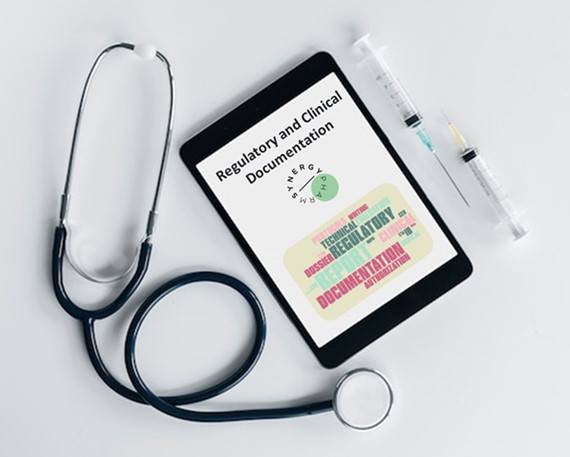
A focus on Synergy Pharm: specialists in clinical and regulatory documentation

July 4, 2023
The Synergy Pharm arm of the Santé Active Edition – Synergy Pharm health communication agency has been meeting the regulatory medical writing needs of the pharmaceutical and cosmetics industries, biotech companies, manufacturers of medical devices, healthcare professionals, and the wider scientific research community for more than 30 years.
Synergy Pharm is also a member of France Biotech, and has obtained the Research Tax Credit (“Crédit Impôt Recherche”; CIR) accreditation in France as a service provider performing research and development (R&D) work on behalf of clients eligible for the CIR.
What do our medical writers do and why do they do it?
The clinical trials that are essential for establishing the safety and efficacy of medicines, medical devices and care procedures are highly regulated to ensure the rigorous evaluation of the innovation and protect the rights, safety, and wellbeing of the participants. National and international regulatory authorities (such as the European Medicines Agency [EMA] and the Food and Drug Administration [FDA]) require a range of regulatory clinical documentation, which must be drafted according to specific guidelines and evaluated before any medicines or medical devices are made available on the market. In addition, during the lifespan of any drug, regulatory authorities also require updates to evaluate the long-term effects of medicines when used in real-life settings.
As specialists in regulatory medical writing, our medical writing team has extensive experience in producing the high-quality clinical trial documentation required by regulatory authorities, assisting our clients throughout all stages of the process.
Before the clinical study
Our team provides medical writing assistance for drafting the many documents required for Clinical Trial Authorization (CTA) dossiers including:
- Investigational Medicine Product Dossiers (IMPDs), containing information on the quality of the product(s) to be used during the clinical trial (study product, reference product, placebo), their manufacture, the controls carried out, and the data previously obtained in nonclinical and clinical studies where applicable.
- Investigator Brochures (IBs),containing the information necessary for investigators and other healthcare professionals involved in conducting the clinical trial (summary of all preclinical and clinical studies that have been conducted with the study product, and information on the doses to be administered, frequency and method of administration, etc.).
- Scientific Advice Briefing Documentation, containing questions and the answers of the applicant for preparing the clinical study protocol. The Committee for Human Medicinal Products (CHMP) reviews the documentation and submits advice to the applicant.
- Clinical Study Protocols (CSPs), containing a description of the basis of the clinical trial (context, hypotheses, objectives, etc.) and the information necessary for the proper conduct of the clinical trial (subject inclusion and exclusion criteria, trial duration, number of visits, schedule, products used with their dose and frequency of administration, information collected, method for evaluating the efficacy and safety of the products evaluated, etc.). A synopsis or summary of the protocol is also required.
- Newsletters to participants, containing the information necessary to enable potential participants to make an informed decision on whether to participate in the clinical trial (including the objectives and conduct of the study, participant involvement, types of products used, possible risks, expected benefits, etc.).
- Informed Consent Forms for recording the patient’s consent to participate in the clinical trial after receiving all the necessary information.
- Pediatric Investigation Plans (PIPs),required for clinical trials concerning products intended for children.
After the clinical study
Our medical writing agency takes care of writing all the essential documents required to obtain marketing authorization for medicines and medical devices including:
- Clinical study reports(CSRs), bringing together the results and conclusions of the study (efficacy of the product evaluated, adverse effects felt by the participants, etc.) in accordance with a format established by health authorities. On 31 January 2023, the Clinical Trials Information System (CTIS) became the single entry point for submission of data and information relating to clinical trials required under EU Regulation. All information in the EU database will be publicly accessible in the CTIS unless its confidentiality can be justified.
- Lay summaries, describing the context, objectives, and results of the clinical study in accessible language so that it can be understood by everyone. The lay summary must be published in the European Clinical Study Database within one year of the end of the clinical study or within six months for a pediatric study.
- Marketing Authorization Applications, including the nonclinical (Module 2.6) and clinical (Modules 2.5 and 2.7) documents for the Common Technical Document (CTD), as well as a critical appraisal of existing evidence through a literature review.
- Answers to the questions of the CHMP, provided after their assessment of the application dossier and before any opinion regarding marketing authorization.
- Safety reports, including the 120-day safety update or 4-Month Safety Update (4MSU); pharmacovigilance documents including the Periodic Safety Update Report (PSUR)/Periodic Benefit-Risk Evaluation Report (PBRER), and Development Safety Update Report (DSUR); and the Drug Abuse Liability Assessment (DALA).
- Clinical Evaluation Reports (CERs) for Medical Devices, describing the results and conclusions of clinical investigations and any clinical evidence from the scientific literature or post-marketing surveillance or follow-up studies. Medical device evaluation and CERs are required for all medical devices in the EU (under regulation REGULATION (EU) 2017/745) and are essential for CE certification.
How does our medical writing company work to meet all the needs of our clients?
Confidentiality: We sign confidentiality agreements for all our projects.
Keeping up to date: All our team continuously update their medical writing skills. We keep abreast of the regulations and inform you about their evolution. Visit our news page to see our article from early this year providing information about the new transition period for Clinical Trials Regulation (Regulation (EU) No 536/2014).
Critical review of documentation and data: compiling regulatory dossiers gives our experienced team an ideal opportunity to critically review the scientific documents associated with the projects of our clients, allowing us to identify any potential errors in the data or in their analysis at the outset, avoiding any problems further down the line.
Biostatistical analyses: if our clients need help with biostatistical analysis for their clinical studies, including services and support during the design of the study, writing of the statistical analysis plan, and the programming of models and post-hoc analyses, we have help at hand through our partner QualityStat.
Quality control: All our documents are prepared to International Council for Harmonization (ICH) standards and in accordance with our standard operating procedures (SOPs): the quality of all our projects is verified by another medical writer in our team at each stage of the writing process.
By entrusting the writing of your pharmaceutical documentation to Synergy Pharm, you are guaranteed quality and rigor, as well as a writing schedule that complies with your deadlines. Don’t hesitate to get in touch to discuss your projects!